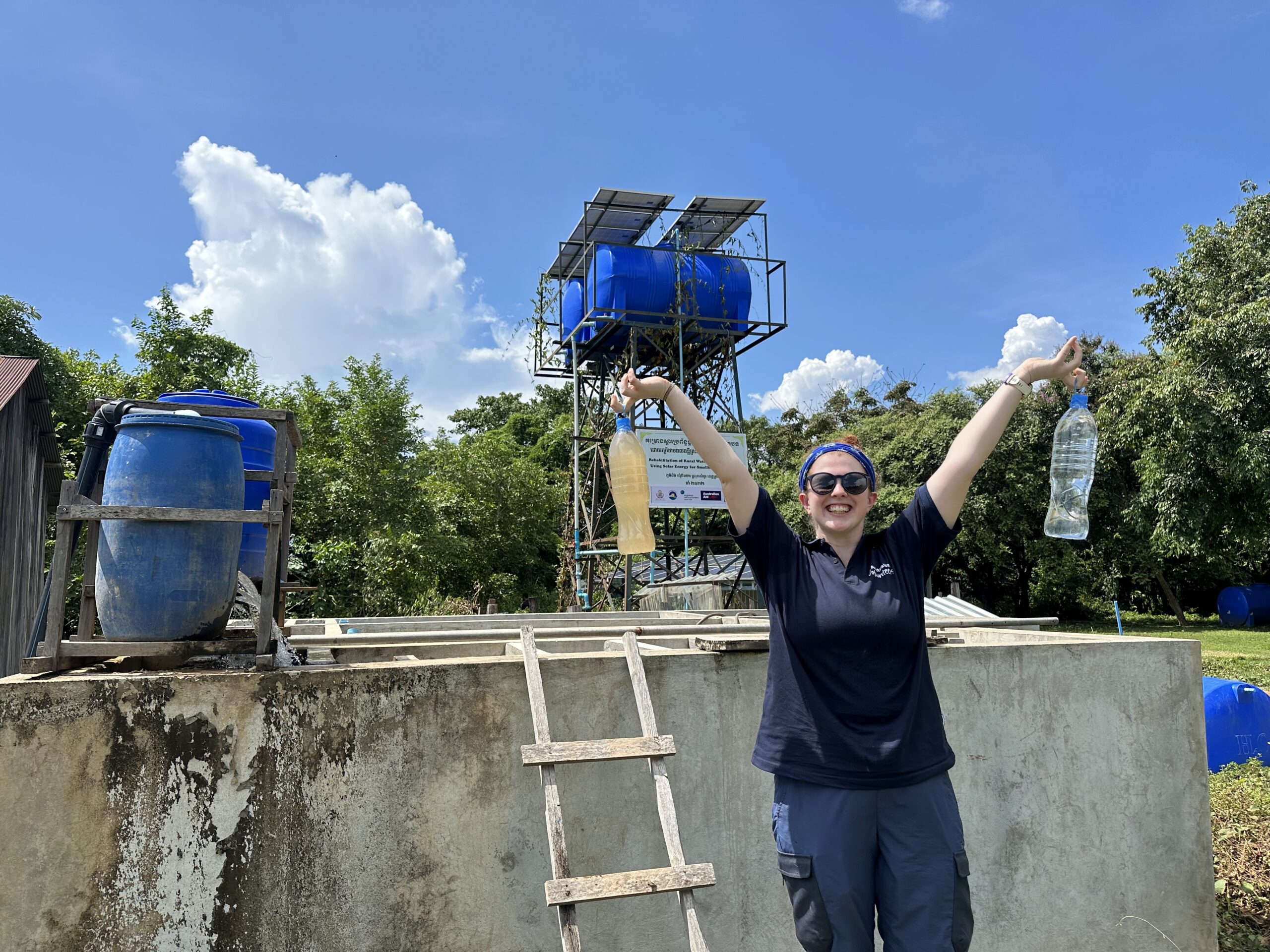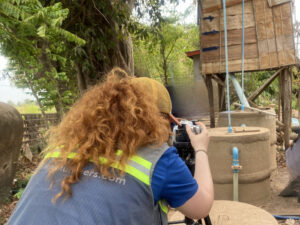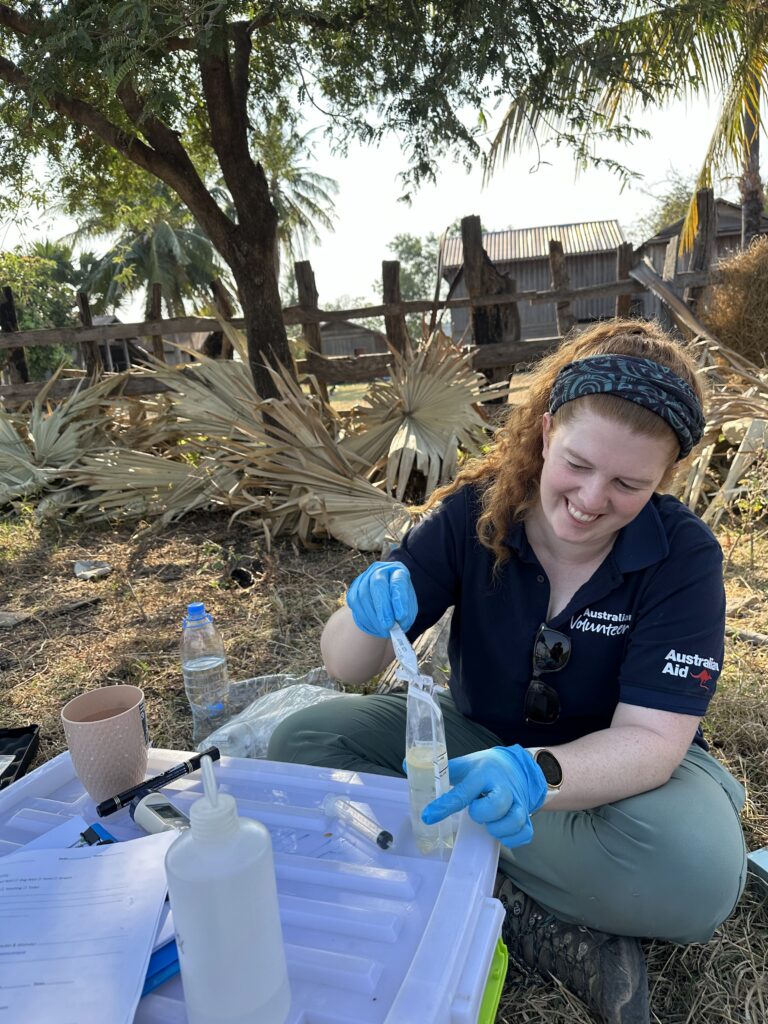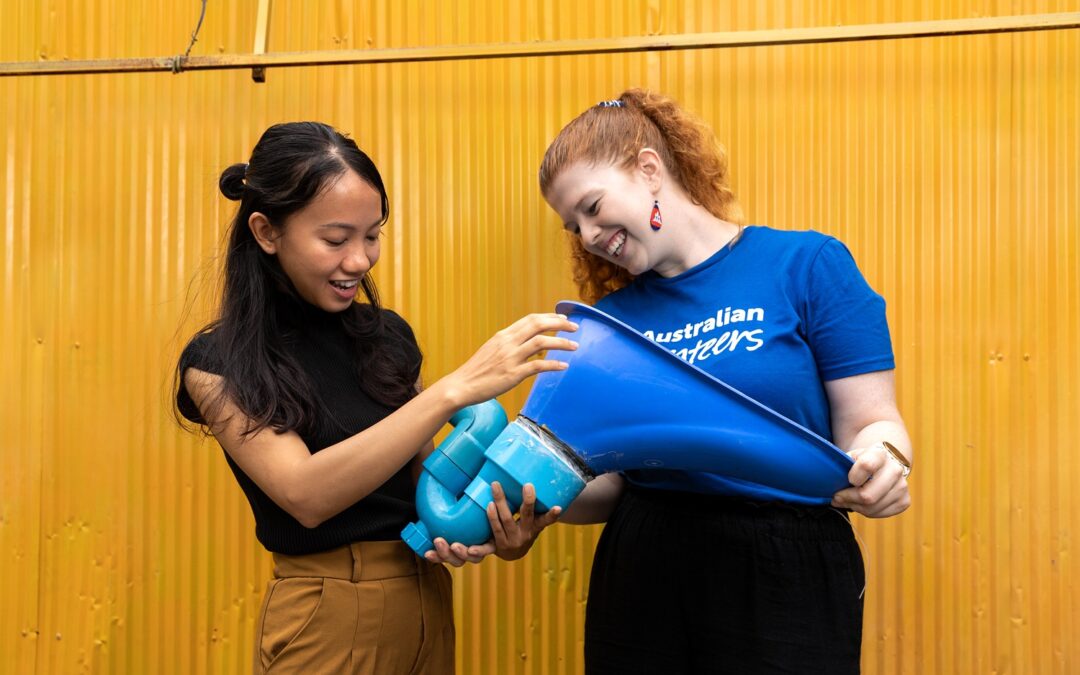When Meg Cummins first set foot in Phnom Penh, Cambodia as an Environmental Engineering Mentor with Engineers Without Borders Australia (EWB), she was driven by a desire to create lasting change. Now, as she prepares to return to her role at Aurecon after a 12-month sabbatical, Meg reflects on a journey that has reshaped her understanding of engineering, community and impact.
Meg’s passion for making a difference began early. After high school, she chose a unique “schoolies” experience; volunteering at an orangutan rehabilitation centre in Borneo. There, she witnessed a stark contrast. “Everyone there had the latest smartphone but nobody had access to drinking water… it blew my mind that the very basic right of having access to clean drinking water wasn’t there and I realised that’s the problem I wanted to help solve,” she recalls.
That moment set her on the path to studying environmental engineering, which eventually led to a role at engineering firm Aurecon, where she found ways to combine her day job with her passion for humanitarian work.
Through her role at Aurecon, Meg first encountered EWB Australia. Her passion for humanitarian engineering led her to coordinate a pro-bono project for EWB, developing a solar-powered treatment plant delivering clean water to residents of Koh Tnout Island on the Mekong River.

Volunteer Meg Cummins standing next to the solar-powered water treatment plant on Koh Tnout Island, on the day the project was officially handed over to the community – a system she helped design years earlier while working at Aurecon.
“It was awesome. I spent one day a week on it, and it was the highlight of my week,” says Meg. “Even though I was working remotely because of COVID-19, I felt really connected to the project.”
Meg found the experience rewarding, not just professionally but personally too.
“I learned so much outside of engineering. It wasn’t just about solving a technical problem, it was about listening to the community, learning more about their concerns and figuring out how to meet their needs.”
Working closely with the Cambodia team gave Meg an early glimpse into what it was like to collaborate across cultures and contexts. “The team was so supportive and so knowledgeable. It made me realise how much I still had to learn about working with communities rather than for them.”
When the borders reopened, Meg jumped at the chance to volunteer as a Field Professional through EWB’s overseas volunteer program, supported by the Australian Volunteers Program.
On the ground in Cambodia
Meg’s role in Cambodia was multifaceted. As part of a six-person team, she worked both in the capital and in remote communities, often embarking on week-long trips. Her primary focus was providing access to sanitation in challenging environments.
“We’re working on developing toilets for communities that live in areas that have really hard ground… or communities that seasonally flood,” she explains. Many of these communities lacked toilet facilities, leading to open defecation and associated health risks. Meg emphasises the broader impact: “Having a functioning toilet can mean better health, more access to education, and the ability to work without constantly being sick. That opens up whole new opportunities for the community.”
Meg and her team don’t just design and install, crucially, they consult. Each project starts with deep conversations with local communities. “It’s not about parachuting in a one-size-fits-all solution,” she explains. “We’re asking, ‘What do you want out of this? What are your daily challenges?’”
On one recent trip, Meg and the team met five different village representatives to learn about their access to clean water and sanitation. “One man said, ‘No one has ever offered to see if this water was okay to drink.’ These communities want to take control of their health and wellbeing. EWB helps provide the tools and skills to do that.”
During her volunteer placement, Meg found herself in a rare and unique position. She was able to handover the water supply system to the people of Koh Tnoat, the very same water supply system she had helped design years earlier while working at Aurcon on the pro-bono project with EWB.
“It’s really special getting to see it impacting people”, she says. “Most of the time with projects like this, you don’t get to see the outcomes firsthand, you’re already onto the next project. It felt like everything had come full circle.”
Lessons in human-centred design
Living and working in Cambodia offered Meg a unique perspective. “I have learned so much, and it’s completely different from working in an Australian context,” she notes. Unlike large-scale projects in Australia, where engineers might not see the immediate impact, in Cambodia, Meg witnessed firsthand how her work affected communities.
She’s picked up plenty of unexpected skills, from writing interview questions tofilming videos and even running community consultation. “As an engineer, you’re often a small cog in a giant machine. Here, you get to do everything. It’s so cool to be hands-on and see the direct impact.”

Meg’s interactions with the local team and communities were also something that she’ll never forget.
“The EWB team in Cambodia are the most incredible team, and they are so passionate,” she says. In her role as a mentor, she learned the importance of listening and collaboration, realising that “we are not the solution; we are part of this journey for them.”
Reflecting on her journey, Meg encourages young professionals and recent graduates to consider volunteering with EWB. “I think this experience has given me more confidence and I have learned that I am open, and passionate, and I’m okay with making mistakes in a safe environment.”
“I went into this thinking I didn’t have enough experience but didn’t realise that I could also support the team through my experiences at university and as a graduate engineer.”
As she prepares to return to Aurecon, Meg is eager to share her insights: “I’m really excited to go back to Aurecon and share what I learned here. At first, I had no one to ask questions of when I wanted to explore this path. Now, I can be that person for others. I want to show young engineers that this kind of work is possible.”
So, why volunteer with EWB?
For recent graduates or young professionals thinking about volunteering, Meg’s message is simple: “Do it. Throw yourself in. You’ll pick up skills you never knew you had, and more importantly, you’ll grow in ways you can’t predict.”

Meg testing pond and groundwater samples for E. coli in Preah Vihear province as part of a water quality assessment.
She adds, “When you volunteer with Engineers Without Borders Australia, you don’t just hand over a report, you hand over a solution to a community, a solution you’ve worked on with that community. You see the project from start to finish, and you see how it changes lives.”
So for those seeking to apply their engineering skills to meaningful, community-driven projects, Engineers Without Borders Australia is always looking for new volunteers. Explore how you can contribute to sustainable change and grow both professionally and personally here.
Thank you to Meg for sharing your time, skills and passion with the EWB Cambodia team! We’re so grateful to have had you as part of the team.
The Australian Volunteers Program is an Australian Government-funded initiative.
Feature image caption: Chanrika Keo (L) Engineering Technology Officer and Meg Cummins (R) Australian volunteer Environmental Engineer at Engineers Without Borders Australia holding a prototype for a water scarce sanitation project. Photo: Harjono Djoyobisono / Australian Volunteers Program


